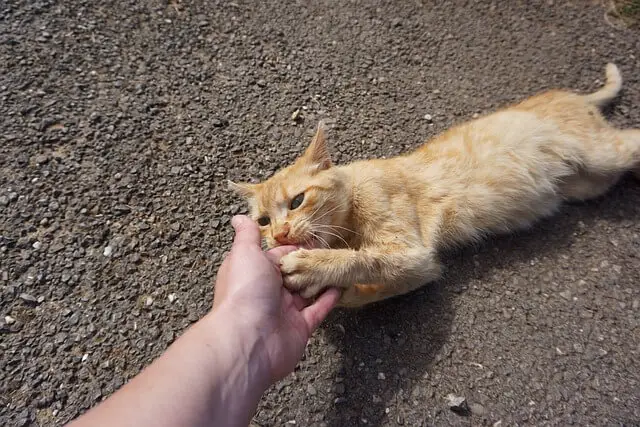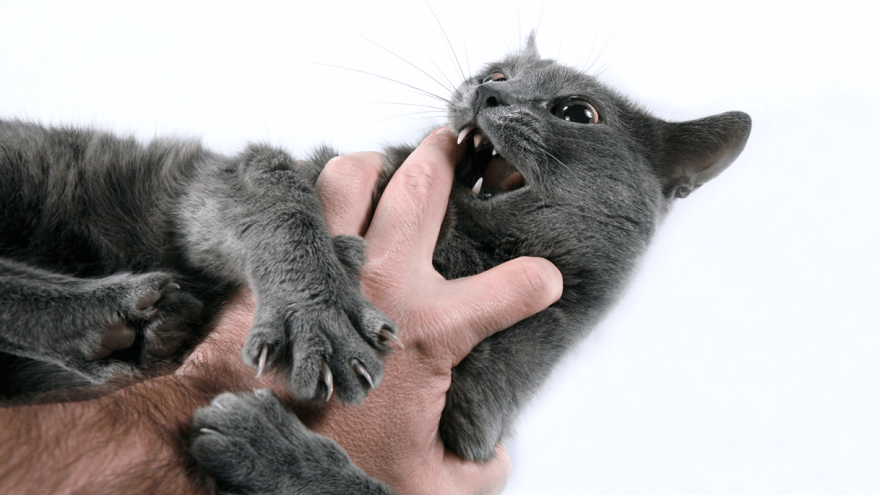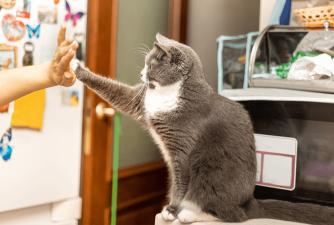Your Cat Bite You? Here Are The Most Common Reasons
05.05.2022.
Cats bite for a variety of reasons, including aggression. Fear, aggression, or desire for attention are some of the reasons adult cats bite. Kittens use their mouths, teeth, and paws to discover the world around them, and a kitten bite is very different than a bite from an adult cat. If you ever asked yourself, "Why does my cat bite me?" you're not alone.
While a kitten's bite may be adorable, an adult cat's bite can be quite painful. You may find yourself dealing with a lot of painful and inconvenient cat bites if you allow them to bite at will, no matter how old they are.
Cats can be taught to reduce their bites' force and use paws without claws with some practice. Once you teach your cat to use paws and no claws to play-smack you, you can engage in a safe game of nibbling and smacking with your pet.
RELATED: Why Are Cats Afraid Of Cucumbers? Here Are Two Possible Explanations
Why do adult cats bite?
In order to prevent this behavior in your cat, it's important to understand the underlying reasons your cat might bite. In contrast to kittens, adult cats can bite for various reasons. However, the most common reason an adult cat bites is a socialization issue.
In order for a kitten to learn good manners, it must interact with other kittens, adult cats, and their mother. Cats often find new homes before learning these critical lessons, and their new owners must teach them. Most cat owners cannot teach their kittens the same way their mothers could, so it is crucial to socialize and train them.
From the moment your cat or kitten gets into your home, begin training them. Kittens learn the most from a well-adjusted adult cat who knows how to play gently. Kittens can bite for communication, as an exploration tool, or simply because teething hurts and they want to alleviate the pain.
RELATED: Why Do Cats Love Boxes? 7 Possible Reasons
However, adult cats can bite for different reasons. The most common ones are:
- If your cat displays dominance or responds to a threat, it might bite you and refuse to back down.
- Cats may use their teeth to stop unwanted human or animal behavior, particularly if this has worked in the past. It's possible for them to have developed a habit of biting when their nails when you want to give them a bath. In many cases, the bite works, and the bathing stops.
- It's not uncommon for cats to use their teeth in an attempt to get their owners' attention. Instead of meowing or vocalizing their needs, they bite you. This is usually displayed as a simple nip. After the nip, the cat will show you to a specific activity like playing or cuddling.
How to stop cat bites?
Even though you may never completely stop your feline companion from biting you, there are a few things you can do. Depending on your cat's age and the biting reason, you may have to adapt your biting prevention training.
- All household members, as well as visitors, should enforce consistent responses and stick to the same rules. It will be more difficult for you to implement your training if the cat receives conflicting messages.

RELATED: Why do Cats Knead? What Does Kneading Mean?
- Teach your adult cat or kitten never to play with your hands, fingers, or toes. You should teach all your cats that their hands aren't for playing. You're allowing them to practice a risky habit if you use your body parts as toys your cat can play with.
- Provide the cat with an appropriate toy to bite on. Many cats enjoy stuffed animals. There should be at least three different kinds of toys your cat can play with. That will prevent boredom. Treat dispensing toys help teach kittens that gentle playing will be rewarded. Plus, such toys will keep your cat's environment stimulating.
- When your cat's paws or mouth are softer than expected, praise them by repeating constant phrases, like "Nice" or "Good." However, if the cat claws you or the biting hurts, make a yelping noise and stop playing with your cat. That is not a punishment but a diversion tactic that will steer the cat from the behavior.
- Be prepared to endure a bit of pain because your cat might bite you and decide they won't let go. You have to force your bitten body part toward the cat to make them release the bite. Pulling your arm away from a painful bite causes it to become even deeper and more painful. Your clothing should be considered your skin and off-limits for your cat. That will teach them not to claw at jeans or bare legs.
- Replace bad habits with good ones. You can teach your cat to sit and wait for a reward. For example, when you walk into a room and the cat attacks your feet, get them to obey the command instead of attacking you. Afterward, they will eagerly wait for you to enter a room so they can receive a reward. You can teach your cat to respond to commands by using a clicker. Your cat will eventually associate clicking with food rewards, so you won't have to keep giving food treats.
- Avoid physically punishing your cat, as this only increases the cat's arousal and makes them more likely to defend themselves.
Treating a bite wound
It is dangerous for you and your other pets to be bitten by a cat. Cat bites pose a severe threat to your health and should be taken care of immediately. See a doctor if your cat bites you, especially if the bite is deep and severe.
Bacteria such as Staphylococcus, Streptococcus, and Pasteurella species are transmitted through the bites of up to 75% of all cats. Because of the Bartonella Henselae bacteria found in cat scratches and cat bites, cat scratch fever can also be transmitted.
RELATED: What Does Catnip Do to Cats?
The joints, hands, and tendons are particularly vulnerable to infection. Symptoms can appear a few hours after the incident. If a cat attacks you, take the following action:
- Pressing the wound can force the bacteria from the wound. It's possible that this will increase the bleeding, but it's also an excellent way to get rid of the bacteria.
- Using soap and water, thoroughly clean the wound. Wipe the wound with a fresh cloth.
- Go to your doctor, and be prepared to endure a re-cleanse of the wound. If your tetanus shot is no longer current, your doctor may recommend a course of antibiotics, as well as stitching the bite site.
- Keep the wound clean after the examination and follow their care plan. Keep an eye out for infection symptoms. Things like swelling, pain, redness, oozing, or fever can all indicate an infection. If you notice these symptoms, go back to the doctor immediately.
World Cat Finder Team




Share